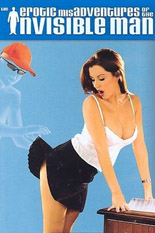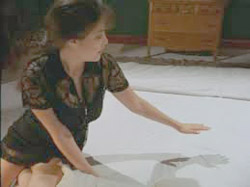
 Based on the adult comic book Butterscotch by Italian writer/artist Milo Manara, The Erotic Misadventures of the Invisible Man is exactly the Skinemax entry you think it is, but with opening credits appearing in the dreaded Comic Sans typeface.
Based on the adult comic book Butterscotch by Italian writer/artist Milo Manara, The Erotic Misadventures of the Invisible Man is exactly the Skinemax entry you think it is, but with opening credits appearing in the dreaded Comic Sans typeface.
Having just been dumped by aspiring actress Rachal (Elina Madison, Creepshow 3), aspiring actor Norman (Scott Coppola, not part of Francis Ford’s filmmaking dynasty) nurses a broken heart as he waits tables. At one such gig, his luck changes when he attracts the attention of aspiring actress Kelly (Gabriella Hall, The Exotic Time Machine), but also is rendered invisible after a jug of what looks like buffalo sauce spills on him. Although no one can see Norman, everyone can smell him; several characters detect the scent of butterscotch — sniff out the connection?
 To illustrate Norman’s outta-sight shenanigans, writer/director Rolfe Kanefsky (showing none of the promise of his debut film, There’s Nothing Out There) cheaply makes a lot of objects move on their own — telephone, champagne flute, hotel bell, vacuum hose, anal beads — and tears off the occasional outfit from his movie’s interchangeable female bodies. (Exclaims an Italian woman witnessing an instance of the latter, “She’s being uh-raped-uh by a ghost-uh!”)
To illustrate Norman’s outta-sight shenanigans, writer/director Rolfe Kanefsky (showing none of the promise of his debut film, There’s Nothing Out There) cheaply makes a lot of objects move on their own — telephone, champagne flute, hotel bell, vacuum hose, anal beads — and tears off the occasional outfit from his movie’s interchangeable female bodies. (Exclaims an Italian woman witnessing an instance of the latter, “She’s being uh-raped-uh by a ghost-uh!”)
Much elongated softcore sex ensues, including between Kelly and an invisible Norman, challenging Hall to act petting, tugging and humping something that isn’t there. Master Thespian would be proud.
Misadventures exerts no effort beyond the simulated thrusts and gyrations of its performers. Kanefsky’s cornball dialogue seems to draw inspiration from childrens’ joke books (“Can’t wait to see the look on Kelly’s face when she doesn’t see me!”), and situations that I’m sure had them in stitches on set start flat and fall from there, such as a man in a full duck costume walking into a bar and asking for grapes.
In interest of transparency, I almost laughed once, when a partygoer (Michelle Bauer, Sorority Babes in the Slimeball Bowl-O-Rama) hears Kelly’s last name and inquires, “Parkinson? Like the disease?” Yes. —Ed Donovan
